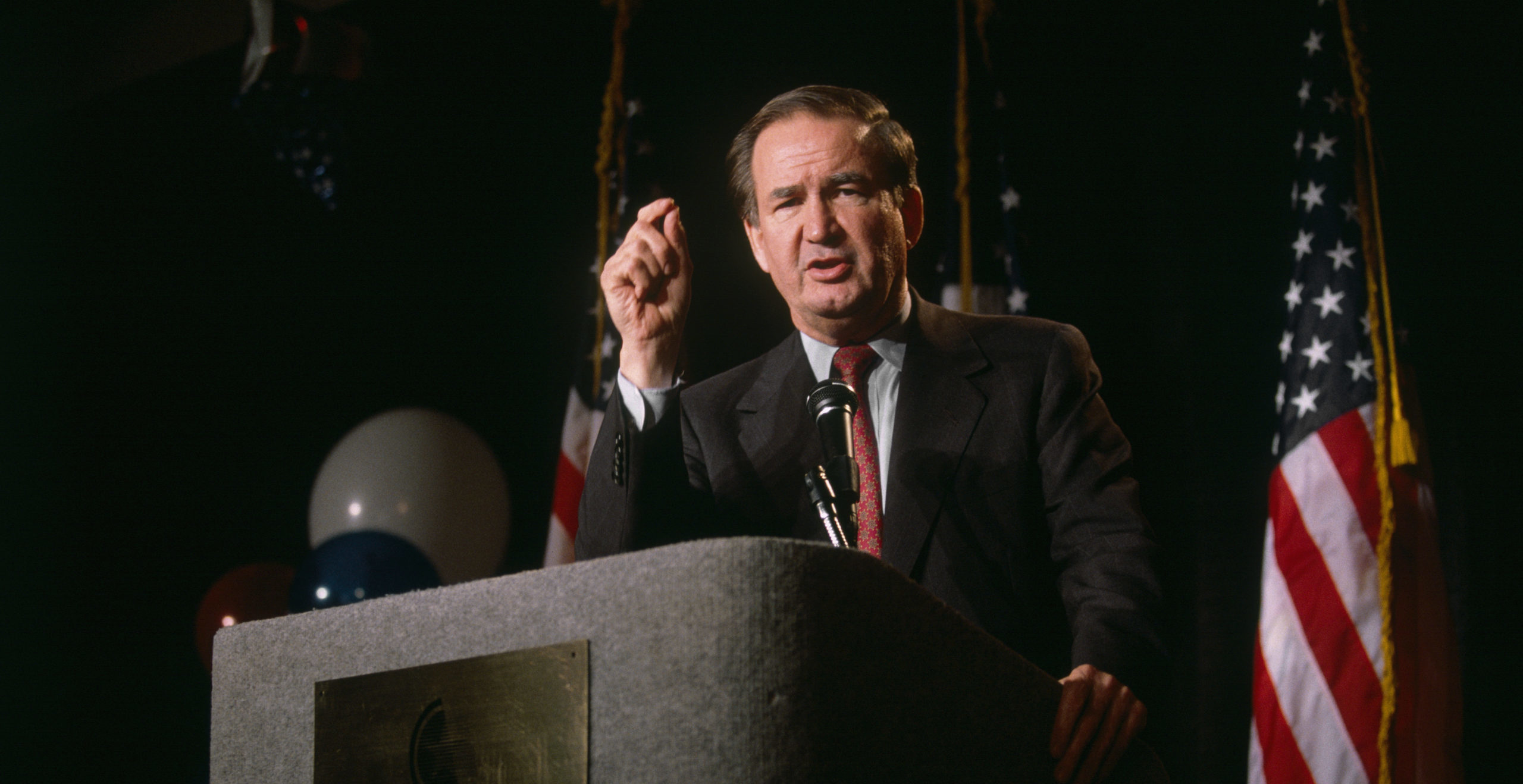Honor Patrick J. Buchanan with the Presidential Medal of Freedom
The TAC co-founder made the world we’re living in.

The Presidential Medal of Freedom is the highest honor a civilian can receive, and over the years it has been awarded to a diverse group of recipients. In 2020, during the State of the Union Address, President Donald J. Trump awarded Rush Limbaugh the Medal of Freedom. Limbaugh, a leading conservative voice and defender of liberty, was worthy of the high honor. Now in retirement, Patrick J. Buchanan is another leading conservative voice and defender of liberty who is also worthy of such an honor. It was Buchanan’s traditional conservatism that paved the way for President Trump’s America First movement.
During the 1990s and into the 2000s, Buchanan was a voice of one calling in the wilderness, warning the nation about unrestricted immigration, free-trade agreements that were decimating the middle class and outsourcing our manufacturing base, and the consequences of the neoconservative and liberal internationalism that resulted in endless wars. Buchanan also defended traditional values such as marriage and the life of the unborn, and he fought against the progressive attacks upon American history.
As a candidate for the Republican presidential nomination in 1992 and in 1996, and as the Reform Party nominee in 2000, Buchanan also championed traditional conservative positions such as opposing affirmative action, reducing the size and scope of the federal government, placing the Constitution first, and protecting the sovereignty of the United States.
Buchanan did not just campaign on an America First platform, but he also reminded conservatives about their intellectual heritage. For decades both the Republican Party and the conservative movement had embraced liberal internationalism characterized by free trade, open borders, and promoting democracy overseas. This liberal internationalism had more in common with President Woodrow Wilson and progressivism than it did with conservatism.
Whether it was NAFTA, WTO, granting Most Favored Nation (MFN) status to China, among other free trade agreements, Buchanan warned that blindly embracing globalization would have consequences to both the economy and national sovereignty. Further, endless wars to spread democracy and exercises in nation building resulted in a grand failure of foreign policy. “How did America lose the world? Through an ignorance of history, an embrace of ideology, and an arrogance of power—hubris,” wrote Buchanan in Day of Reckoning: How Hubris, Ideology, and Greed are Tearing America Apart.
Buchanan was also prophetic about the dangers of unlimited immigration both legal and illegal. During his campaign for the Republican nomination, he called for not only a secure border, but a border fence, long before “build the wall” became the rallying cry of the Trump campaign. Buchanan was part of a minority within the conservative movement and the Republican Party that opposed uncontrolled immigration.
In a Republican Party and a conservative movement that increasingly viewed immigration and citizenship as a jobs program, Buchanan took the direct opposite position. “Uncontrolled immigration threatens to deconstruct the nation we grew up in and convert America into a conglomeration of peoples with almost nothing in common—not history, heroes, languages, culture, faith, or ancestors,” wrote Buchanan in The Death of the West: How Dying Populations and Immigrant Invasions Imperil Our Country and Civilization. Uncontrolled immigration not only represented a security threat, but it had economic consequences, and it impacted the cultural framework of the nation.
Perhaps most important was Buchanan’s defense of Americanism and Western civilization. Buchanan, like Trump, defends the United States and its history. What made the United States exceptional was not only its history and ideals, but also the Christian foundation of the nation. “Is it not a people of a common ancestry, culture, and language, who worship the same God, revere the same heroes, cherish the same history, celebrate the same holidays…,” stated Buchanan in Suicide of a Superpower: Will America Survive to 2025? This is a philosophy that is also expressed by Vice President-elect J.D. Vance.
Buchanan’s conservatism appealed to Americans who increasingly believed that both political parties had forgotten them; many of these “Buchanan Brigade” members would become Trump supporters. “They don’t read Adam Smith or Edmund Burke, but they come from the same schoolyards and the same playgrounds and towns as we come from. They share our beliefs and convictions, our hopes, and our dreams. They are the conservatives of the heart,” stated Buchanan in describing these patriotic Americans.
Through his political campaigns, television commentary, twice-weekly newspaper columns, and numerous books, which will stand the test of time, Buchanan was both prophetic and a movement conservative that influenced many. In a 2017 interview with POLITICO, Buchanan stated that his “ideas made it,” but “I didn’t.”
When Trump selected Vance as his running mate, many free-market conservatives were disappointed, and others stated that the Republican Party was now the party of Pat Buchanan.
Subscribe Today
Get daily emails in your inbox
Although trying to win the presidency, Buchanan was more of an intellectual. He helped remind conservatives of their heritage and their philosophy. The American Founders, Whigs like Henry Clay and Daniel Webster, and Republican Party leaders from Abraham Lincoln through Herbert Hoover, all embraced the conservative nationalism that Buchanan wrote about and defended.
It was the conservatism of Presidents Warren G. Harding and Calvin Coolidge that reflected Buchanan’s philosophy the most: a commitment to limited government, a protectionist trade policy, and a realist foreign policy.
Buchanan is retired, but he paved the way for the America First movement, while defending traditional conservatism and fighting to preserve the history, principles, and values that have made the United States an exceptional nation.